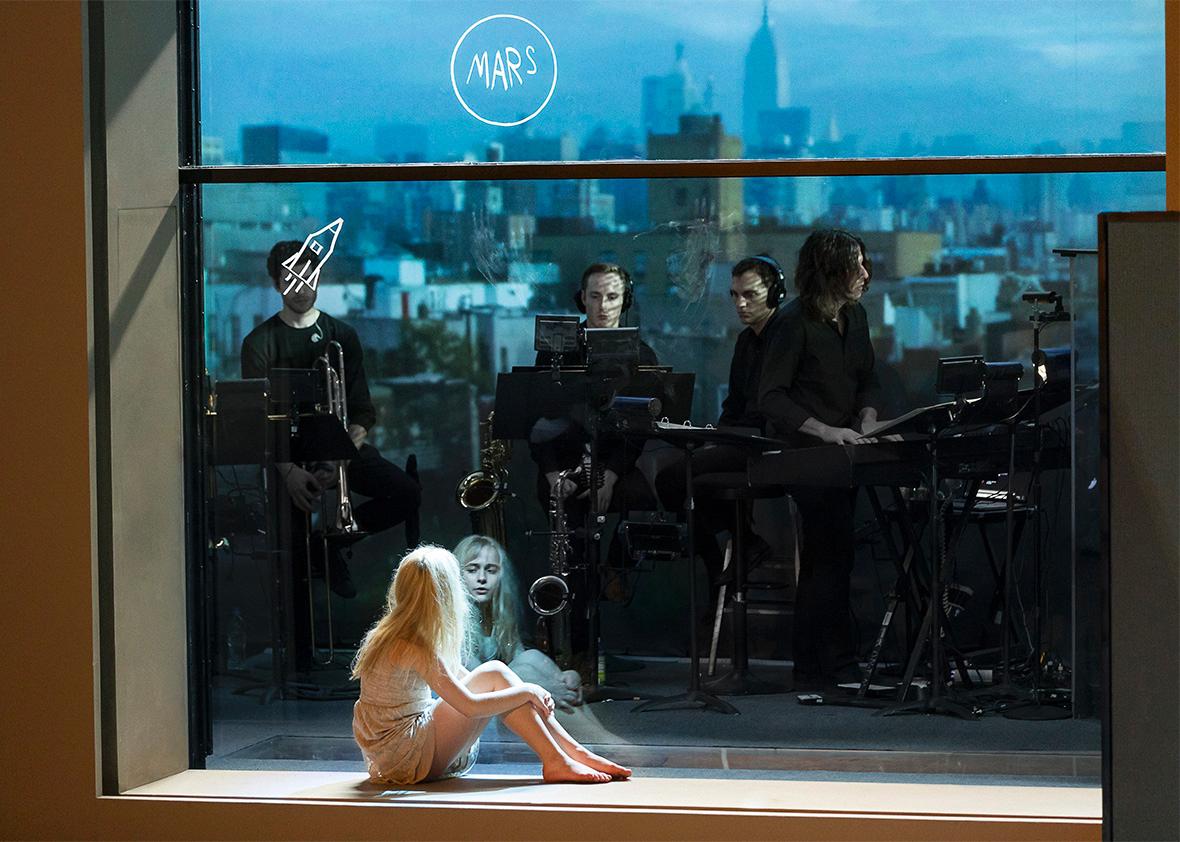David Bowie has wanted to put on a musical for nearly 50 years. In 1968, he drafted Ernie Johnson, a rock opera about a man throwing a suicide party. He first envisioned The Rise and Fall of Ziggy Stardust and the Spiders From Mars as a show like Jesus Christ Superstar: He would originate the role of Ziggy Stardust, then have other singers take it over for road productions. Looking back in a 2002 Radio 4 interview, Bowie recalled being “keen on writing in such a way that it would lead me into leading some kind of rock musical … I think I wanted to write a new kind of musical, and that’s how I saw my future at the time.”
There was his attempt to turn George Orwell’s 1984 into a musical in 1973. He would play Winston Smith, Marianne Faithfull was considered for Julia; the project was soon enough vetoed by Orwell’s widow. So as with Ziggy, he turned a stillborn play into an album: Diamond Dogs, in this case. On it went through the years: countless rumors, nothing ever produced. Around 1999, Bowie considered reviving Ziggy Stardust for the millennium in a multi-tiered offering: There would be (again) a Ziggy play, with accompanying film, website, album of re-recorded outtakes. It all came to naught.
In part, this was because Bowie’s itch to move on, his hunger to play something new, was at odds with the hours of toil needed to write and stage a play. And there was always yet another tour, yet another album to make. Now, nearing his 69th birthday and having (apparently) retired from touring, he’s finally done it. Lazarus, opening this week at New York Theatre Workshop in Manhattan, is a strange full-length musical with some strikingly directed sequences and 18 Bowie songs: some warhorses, some relative obscurities, four new ones (including the title song). While some song performances are revelatory, a few feel like Bowie classics being shoehorned into place. The new songs are more functional than memorable, though it’s brutal to be debuted amid Bowie’s standards. It helps that Bowie got pros to do some of the heavy lifting—co-writer Enda Walsh (Once) and star Belgian director Ivo van Hove (most recently seen at NYTW with his Scenes From a Marriage)—and that the cast is impeccable.
Lazarus stars Michael C. Hall as Thomas Jerome Newton, the exiled extraterrestrial that Bowie portrayed in The Man Who Fell to Earth. Stuck in his apartment with the blinds drawn, Newton is essentially Bowie’s album Low made flesh. He’s in the same condition as he was at the end of the film: drunk, isolated, missing his home planet. The musical also features a psychotic with a penchant for stabbing people, Valentine (Michael Esper, who delivers his spotlight number with his smiling face smeared in blood), and Newton’s assistant, Elly (Cristin Milioti), who’s a set of walking nerves, constantly scrabbling in and out of her clothes, once while singing a gin-soaked “Changes.” The heart of the play is a nameless girl played by Sophia Anne Caruso (an astonishing young talent, whom I expect will be starring in Broadway plays for the rest of the century). She’s Newton’s delusion, guardian angel and victim, and sings “Life on Mars?” as the showstopper it was always meant to be, handling the octave vaults in the refrains with effortless ease.
What does it all add up to? “Visionary crap,” pronounced a man sitting behind me at the end of a preview performance. Bowie might crack a smile at such an assessment: It’s a charge that’s undoubtedly been leveled against all of his albums. Does Lazarus succeed as theater? Those unfamiliar with Bowie’s music might be left bewildered (those who hate Bowie’s music should just stay clear), and the attempts to provide character backstories and plot (in one case, involving a well-known actor’s cameo appearance on video) are the play at its most fumbling.
But in truth Lazarus works best as a brilliantly staged collection of motifs and ideas that have obsessed David Bowie, and therefore David Bowie fans, for decades. They’re all here: isolation, spaceships, Kabbalist images, ritual murders, assumed/stolen identities, mime (at times Milioti resembles Columbine, a character in a mime that Bowie performed in 1970), William S. Burroughs–style cut-up visuals and, of course, glam self-transformation (again courtesy of Milioti, who winds up in a blue fright wig and miniskirt). There are sequences written seemingly for the fun of performing them: Hall being hurled across the stage like a sack of grain by a woman in a full kabuki costume, or doing a belly-slide through splattered milk-blood while singing the “I wish you could swim, like dolphins can swim” line in “Heroes.”
Central to Bowie’s return has been his insistence on doing what he wants, with no explanations offered: “I’m happy, hope you’re happy too,” as Major Tom would say. There’s a bit midway through Lazarus that’sdramatically baffling. Hall, playing Newton, pulls out Bowie’s The Next Day album, places it on a turntable, and sings “Where Are We Now?,” Bowie’s comeback song from 2013, while films of Cold War Berlin play behind him. What is this? Was Newton in Berlin in the 1970s, too? (Did he know Iggy Pop? There’s a seed of another play.) There’s no context offered, no connection to anything else happening. But as Hall’s moving performance builds, it becomes clear: This could be the only time “Where Are We Now?” is ever “officially” sung live. I’ve been listening to Bowie for 25 years, and so felt a powerful emotional tug at seeing the alien Thomas Jerome Newton mournfully covering his old interpreter, David Bowie: a character singing back at his maker offstage.
